Versatile Hammers for Blacksmithing
Abana Chapter
February 10, 2024
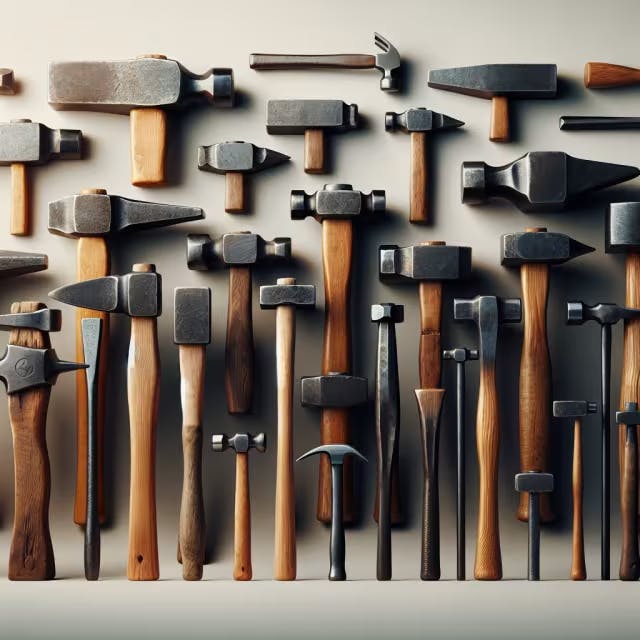
Choosing the right blacksmith hammer for your home forge ventures beyond merely purchasing a tool; it embodies a critical investment into the heart of blacksmithing itself, reflecting both quality and the spirit of the craftsperson behind the metal. With an array of hammers varying in shape, weight, and design, each tailored for specific projects, understanding the nuances of versatile hammers for blacksmithing becomes essential for any enthusiast or professional looking to refine their skill and control in metal work. Opting for lighter, comfortable hammers that match personal preferences and the job at hand, not just brute strength, can significantly enhance one’s forging experience.
Key Takeaways
Choosing the right blacksmith hammer involves understanding its shape, weight, and design, which are crucial for the specific projects you engage in.
The selection of a hammer is a significant investment in blacksmithing, impacting both the quality of work and the blacksmith’s capability.
Comfort and personal preference in weight and handle design enhance the forging experience beyond simply choosing the heaviest hammer available.
Versatility in a hammer is essential, as it allows for a broader range of techniques and projects without needing multiple specialized tools.
For beginners, certain hammers are recommended to start with that ease the learning process and develop fundamental skills.
Advanced blacksmithing techniques require hammers with specific features that allow for more precision and control.
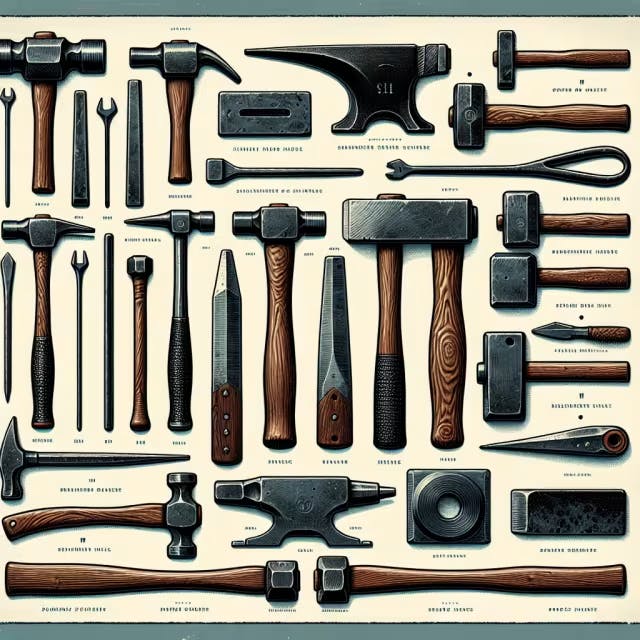
Understanding Blacksmithing Hammers and Their Uses
Choosing the right hammer for your home forge is more than a matter of preference; it's a critical decision that affects the quality of your work. A well-selected hammer acts as an extension of the blacksmith's arm, facilitating precision and control over the metal. Opting for quality over cost is advisable, as a good hammer can last a lifetime and significantly reduce frustration during forging.
Different hammers are designed for specific tasks, with variations in shape, weight, and design to match. For instance, the ball peen hammer is excellent for metal riveting and shaping, while straight and cross peen hammers are better suited for drawing out metal and creating textures.
Skill and control are paramount in blacksmithing, highlighting the importance of a hammer that feels comfortable and is light enough for extended use without sacrificing functionality. Personal preference greatly influences the selection process, guiding blacksmiths toward a hammer that fits their style of work and hand comfort. For a closer look at choosing the right blacksmith hammer for your needs, visit this informative article.
Hammer Type | Best For |
Ball Peen | Metal riveting, shaping |
Straight Peen | Drawing out metal |
Cross Peen | Texturing, spreading metal |
Remember, the key to effective blacksmithing isn't the force applied, but the skill and control with which you wield your hammer. Choose a tool that feels like an extension of yourself, and you'll be on your way to mastering the craft.
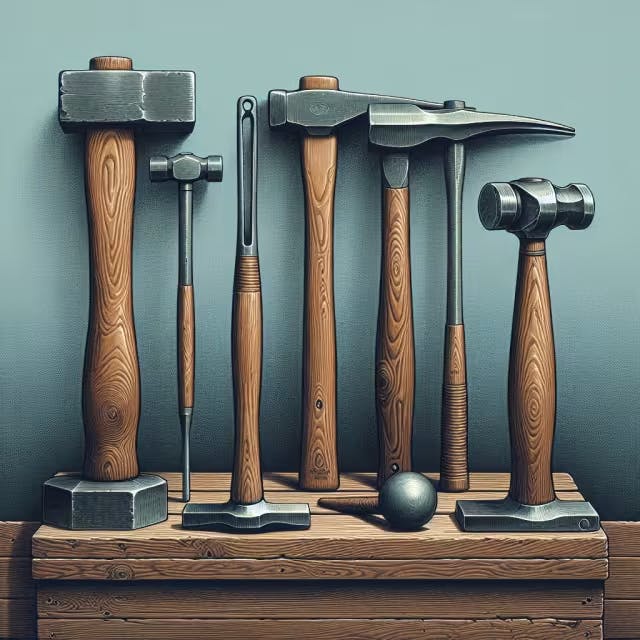
Choosing the Right Hammer for Your Blacksmithing Projects
Selecting the ideal hammer for your blacksmithing needs is more about finding a tool that resonates with your style and the specific demands of your projects. A high-quality hammer, one that feels like a natural extension of your arm, can significantly enhance precision and reduce fatigue during long forging sessions. This insight is grounded in a comprehensive guide by Dan, who underscores the necessity of choosing a hammer not just based on its size or weight but on how it complements your skill set and work type (Read more about hammer selection).
Popular Hammer Types for Various Projects:
Ball Peen: Ideal for metal riveting and rounding off edges of metal pins and fasteners.
Cross Peen: A must-have for intricate work, allowing for precise metal spreading and shaping.
Flatters: Perfect for smoothing out surfaces on large, flat segments of metal.
When scouting for versatile hammers for blacksmithing, assess the hammer's build quality, balance, and grip. A well-constructed hammer reduces the effort needed per strike, allowing for more control and less strain on your hand and wrist. Moreover, the nature of your projects, be it decorative items, blades, or horseshoes, should guide your choice, ensuring that the hammer's design aligns with your forging tasks.
Remember, while a hammer might be highly recommended by others, what works best is ultimately contingent on personal preference and the specific requirements of your craft.
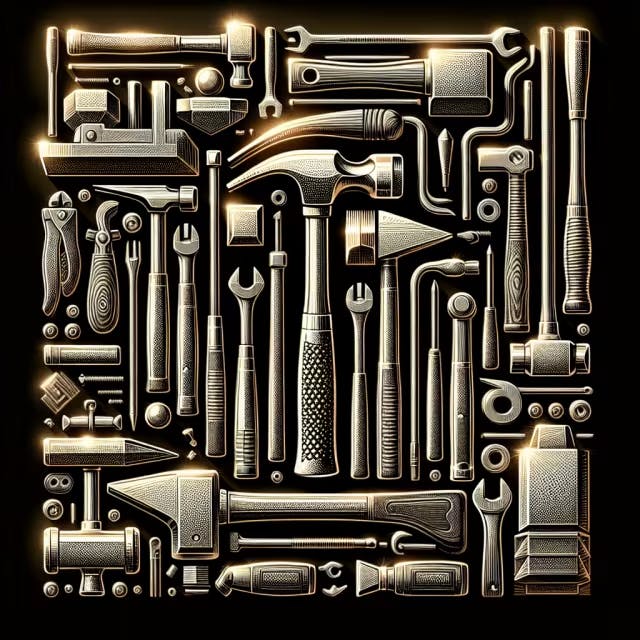
The Importance of Hammer Versatility in Metal Work
Versatility in hammers is key for any blacksmith, whether hobbyist or professional. Each hammer type is crafted to perform specific tasks, enabling artisans to manipulate metal with precision and efficiency. Understanding the distinctions and applications of various hammers can transform how one approaches a project. Here are different hammers pivotal for versatile metalwork:
Claw Hammer: Though commonly associated with carpentry, its ability to pull nails and small spikes makes it useful for cleanup in metal projects.
Ball Peen Hammer: Essential for tasks needing a less aggressive touch like rounding edges or driving pins.
Sledgehammer: Provides the brute force required in forging large pieces or breaking down materials before fine shaping.
Rubber Mallet: Ideal for adjusting without marking or damaging the metal surface, often used in sheet metal work.
Tack Hammer: Small and lightweight, perfect for delicate tasks where precision is more crucial than force.
Choosing the correct hammer involves considering the material of both handle and head for balance, comfort, and durability. Balancing the necessity for specific hammers with the desire to keep your toolkit adaptable allows for a broad range of projects to be undertaken with confidence and skill. For further insights into the various hammers and their uses, explore detailed discussions at Trdsf.com.
By expanding your toolkit with these hammers, you embrace the full spectrum of blacksmithing possibilities, enhancing both your craft and the enjoyment it brings. Each project becomes a new adventure, with the right tools at your disposal to achieve your creative vision.
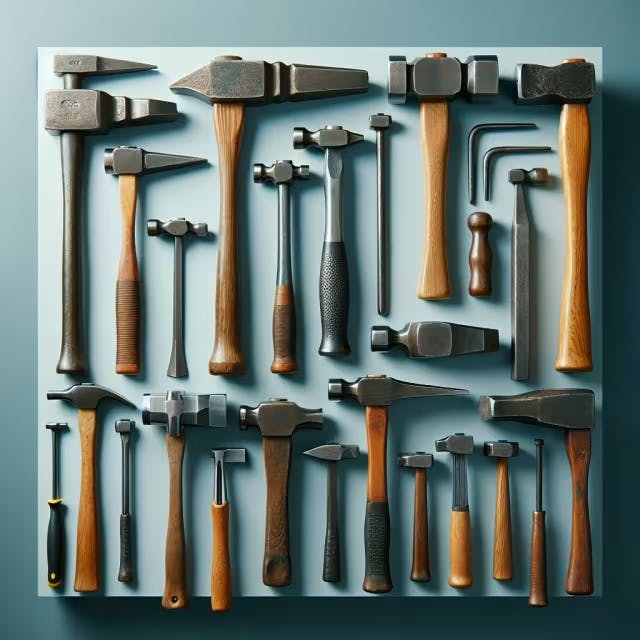
Top Blacksmithing Hammers for Beginners
Selecting the right hammer is a pivotal step for blacksmiths at any skill level, especially beginners embarking on their metalworking journey. Key considerations include the hammer's type, weight, and how well it fits your hand, all of which directly impact your craft's outcome and your comfort during the process.
Cross Pein Hammer: Ideal for general blacksmithing tasks, including drawing out metal and intricate work.
Straight Pein Hammer: Best for directional forging and working in tight spaces.
Rounding Hammer: Offers versatility in shaping metal thanks to its rounded and flat faces.
Each of these hammers serves a unique purpose in shaping metals, and incorporating them into your toolkit will enhance your ability to tackle various projects with precision. Beginners should prioritize comfort and ease of use, focusing on a hammer that feels like a natural extension of their arm. As skills advance, the variety and specificity of hammers can expand to include more specialized tools.
Investing in a high-quality hammer from the start can also save costs in the long run, as these tools are built to last longer and perform better, reducing the need for replacements. Learning about the different hammers available and how they match with various blacksmithing processes can significantly elevate a beginner's craftsmanship. For a more detailed guide on selecting the right blacksmithing hammer, visit workingtheflame.com.
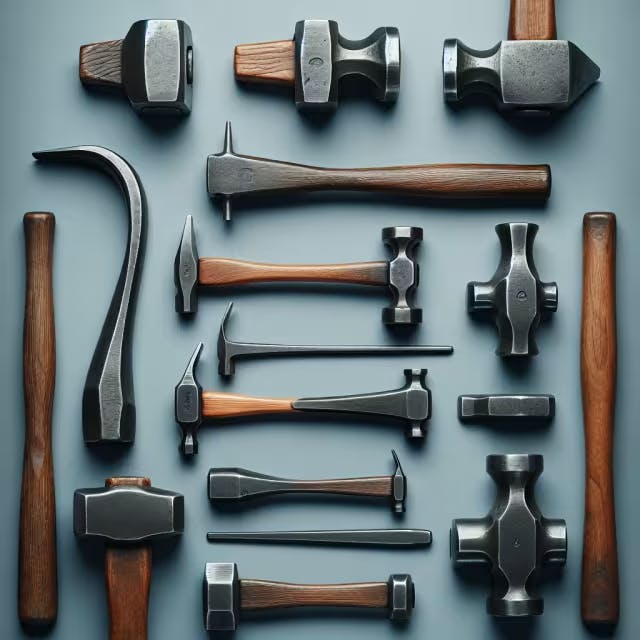
Essential Hammer Features for Advanced Blacksmithing Techniques
Exploring the world of blacksmithing through a personal journey reveals the importance of having the right tools. A father, initially introduced to blacksmithing by his son's interest in knife making, discovered the value of versatile hammers for blacksmithing. Their experience highlighted how essential it is to select the correct hammer for both basic and advanced techniques. Here's what they learned about choosing hammers for their blacksmithing projects:
Weight: The hammer's weight significantly affects control and fatigue. Lighter hammers are great for detailed work, while heavier ones suit larger projects.
Handle: A comfortable handle is crucial. The length and material of the handle can impact the hammer's balance and the user's comfort during prolonged use.
Face: The shape of the hammer's face (flat or rounded) dictates the type of work it can perform. A flat face is suited for general work, whereas a rounded face is ideal for shaping metal.
Material: Durability is key. Hammers made from high-quality steel can withstand the rigors of blacksmithing without deforming.
These insights came from participating in father-son blacksmithing lessons, where they engaged with both basic and advanced blacksmithing skills, revealing a newfound appreciation for the craft. Their experience underscores the craft's depth and the necessity of a well-equipped forge for exploring the full spectrum of blacksmithing projects. For anyone setting up a blacksmith shop, these factors are critical in selecting the right hammer to enrich the crafting experience.
Learn more about their journey into the world of blacksmithing here. This account not only showcases the transformative power of blacksmithing as a hobby but also offers practical advice for newcomers on setting up a forge and selecting the right equipment. Choosing the right hammer is a pivotal step in mastering the art of blacksmithing, bridging the gap between skill and craftsmanship. The versatility offered by hammers such as the Ball Peen, Cross Peen, and Flatters allows for a wide range of techniques and projects, making the selection process a key factor in achieving high-quality results. Whether you're a beginner or an advanced blacksmith, investing in the right versatile hammers is an investment in your craft's future, amplifying your potential for precision, comfort, and overall work quality.
Frequently Asked Questions
What are the key factors to consider when selecting a versatile hammer for blacksmithing?
When selecting a versatile hammer for blacksmithing, several key factors should guide your choice to ensure the tool enhances your craftsmanship and comfort. Consider the hammer's weight and balance, as this will influence your control over the metal and your endurance during long forging sessions. The handle's grip and comfort are paramount for reducing strain on your hand and wrist, impacting the precision of your work. Additionally, assess the hammer's head design (e.g., flat, rounded, pein) according to the types of projects you undertake, as different shapes serve specific metalworking purposes. Opt for a high-quality material to ensure durability and longevity. Tailoring your selection to match your personal preference and the specific needs of your blacksmithing projects will ultimately yield the best results, making the hammer feel like an extension of yourself and enhancing your skillset over time.
How does the type of hammer impact the quality and ease of blacksmithing projects?
The type of hammer used in blacksmithing is crucial as it directly influences the quality of the projects and the ease with which they are completed. Different hammers, such as Ball Peen, Cross Peen, and Straight Peen, are designed for various tasks - from metal riveting and shaping to drawing out metal and creating textures. The choice of hammer impacts not only the precision and control over the metal but also the blacksmith's comfort and fatigue levels during work. A hammer that feels like an extension of the arm enhances skill and reduces frustration, making the forging process more efficient and enjoyable. Thus, selecting a hammer based on its quality, weight, and how it complements the blacksmith’s unique style and project demands is essential for both beginners and experienced blacksmiths.
What role does personal preference play in choosing the right blacksmithing hammer?
Personal preference plays a significant role in choosing the right blacksmithing hammer, guiding blacksmiths towards a tool that feels comfortable and suits their specific style of work. It is important to select a hammer that:
Feels like a natural extension of one's arm, enhancing precision and minimizing fatigue.
Matches the type of projects undertaken, with different hammers designed for tasks such as metal riveting, shaping, and drawing out metal.
Offers the right balance, weight, and grip for the individual's hand, as these factors impact control and comfort during forging.
Choosing a quality hammer that aligns with personal preferences and project requirements can significantly improve the forging experience, making it crucial to consider these aspects carefully.
Why is it important to focus on quality over cost when purchasing a hammer for blacksmithing?
Focusing on quality over cost when purchasing a hammer for blacksmithing is crucial for several reasons. Firstly, a high-quality hammer acts as an extension of the blacksmith's arm, enabling better precision and control, which directly impacts the quality of the work produced. Secondly, choosing a hammer that aligns with the specific tasks at hand, whether it be metal riveting with a ball peen hammer or drawing out metal with straight and cross peen hammers, ensures that the tool complements your skills and project requirements. Lastly, investing in a quality hammer from the outset can lead to long-term savings and reduce frustration, as these tools are designed to last a lifetime and offer consistent performance, minimizing the need for replacements. By considering factors like the hammer's balance, grip, and material, blacksmiths can select tools that enhance their craftsmanship while also providing comfort and reducing the risk of fatigue during long forging sessions.
How can the right hammer enhance precision and reduce fatigue during forging?
Selecting the right hammer for blacksmithing boosts precision and minimizes fatigue by balancing weight, design, and grip tailored to the task and the artisan’s comfort. Not only does the right hammer feel like an extension of the arm, but it also directly influences craftsmanship quality by offering the necessary control for specific blacksmithing tasks. Key points to consider include:
Hammer Type: Different types, such as Cross Pein for detailed work and Rounding for versatile shaping, match various projects.
Weight and Balance: Light enough for long sessions without compromising on the hammer's functionality.
Grip Comfort: Ensures the hammer fits comfortably in hand, reducing strain.
Ultimately, a well-chosen hammer, reflecting personal preference and the nature of the work, enhances skill expression and project outcomes. It's an investment in both the quality of the work produced and the blacksmith's long-term comfort and health.


